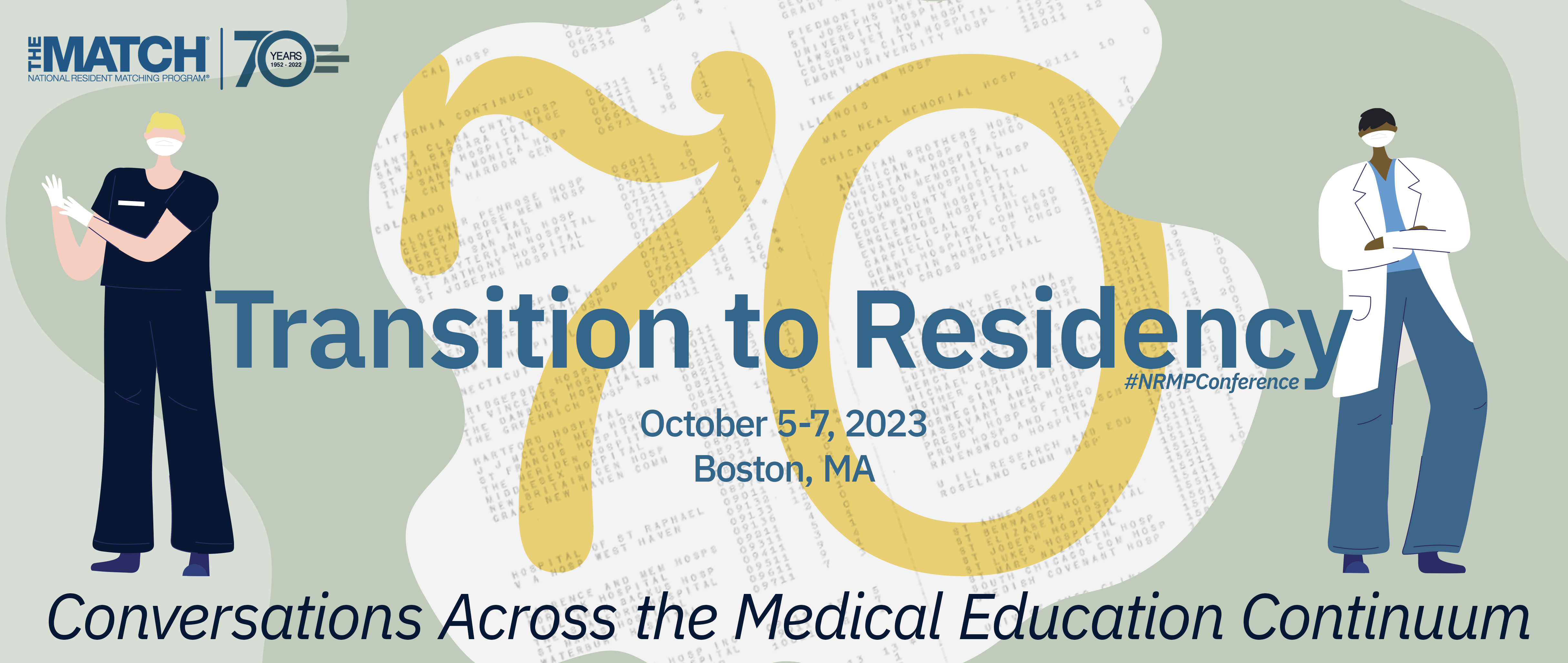
Continuing Medical Education (CME) Information
Course Description
Transition to Residency: Conversations Across the Medical Education Curriculum is attended by medical school deans, medical school faculty, community and academic medical center faculty and staff, administrators, residents and students. The meeting is intended to provide a forum for robust conversation among members of the undergraduate and graduate medical education communities about issues relevant to the transition to residency. The meeting attracts approximately 300 attendees and is held over two days.
Target Audience
MD/DOs, all specialties; Fellow/Resident, Medical Student, Non-Physician, Other, Physician
Educational Objectives
- Discuss the transition from medical school to residency and the tools and resources available to support trainees, programs, and medical schools.
- Assess how social and environmental factors impact trainees as they transition into residency and early career.
- Explore innovative projects and research initiatives that better inform the UME and GME communities’ understanding of the selection, recruitment, and training experience.
Needs Assessment/Practice Gaps
Breakout sessions at the Transition to Residency meeting are intended to explore a wide range of topics including health care workforce, health equity, racial injustice, economic inequalities among leaners, and innovation in medical education, as well as thought leader sessions tackling issues and challenges specific to the transition from undergraduate to graduate medical education and the impact of those challenges on patient populations and care.
Accreditation Statement
This activity has been planned and implemented in accordance with the accreditation requirements and policies of the Accreditation Council for Continuing Medical Education (ACCME) through the joint providership of the University of California, San Diego, School of Medicine and the Association of American Medical Colleges. The University of California, San Diego, School of Medicine is accredited by the ACCME to provide continuing medical education for physicians.
Credit Designation Statement
The University of California San Diego School of Medicine designates this Other activity for a maximum of 15 AMA PRA Category 1 Credits™. Physicians should claim only the credit commensurate with the extent of their participation in the activity.
Cultural and Linguistic Competency
Continuing medical education (CME) providers are required by state Assembly Bills 1195 and 241, and the standards created by the California Medical Association (CMA), to include components that address cultural and linguistic competency and implicit bias in CME activities. The planners and presenters of this activity has been asked to provide meaningful consideration of these standards in the selection and presentation of content. Additional information and resources are available on the UC San Diego CME website.
Conflict of Interest Disclosure
It is the policy of University of California San Diego Continuing Medical Education to ensure that the content of accredited continuing education and related materials is accurate, balanced, objective, and scientifically justified. Education must be free of the influence or control of ineligible companies, and protect learners from promotion, marketing, and commercial bias. All persons in a position to control the content of accredited continuing education must disclose all financial relationships held with ineligible companies, prior to assuming a role in the activity. Those relationships deemed relevant to the education are mitigated prior to the activity through one of the following strategies, depending on the nature of relationship and the role of the person: 1) divesting the financial relationship, 2) altering the individual’s control over content, and/or 3) validating the planning decisions and/or content through independent peer review. All relevant financial relationships are mitigated prior to the activity and mitigation strategies and necessary steps for implementation are communicated to individuals prior to them assuming their role in the activity. Persons who refuse or fail to disclose are disqualified from participating in the activity. Activities are evaluated by participants and peer reviewers to determine if the content was free of bias and met acceptable scientific standards. This information is considered in future activity planning. All relevant financial relationships and the nature of those relationships are noted below. All relevant financial relationships have been mitigated.
Persons in control of content of this educational activity who are not specifically identified by name above, such as (but not limited to) course directors, faculty, CME staff, planners, editorial staff, peer reviewers, and CME committee reviewers do not have any relevant financial relationships.
This educational activity may contain discussion of unlabeled and/or investigational uses of agents that are not approved by the FDA. Please consult the prescribing information for each product. The views and opinions expressed in this activity are those of the faculty and do not necessarily reflect the views of the University of California San Diego School of Medicine.



